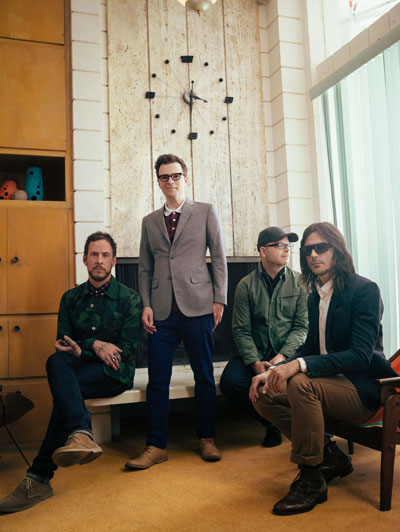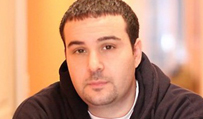A band that has seemed like an effortless pop hit machine since the early 1990s, with early successes including “Buddy Holly,” “Undone—The Sweater Song,” and later, “Hash Pipe,” Beverly Hills” and “Pork and Beans,” Weezer has meant even more than that to critics, fans and alternative radio. The band successfully rode out all of the transformations in the music industry since signing to then-powerhouse Geffen in 1992, followed by Interscope, Epitaph and, currently, Republic Records. For an outfit that initially gained popularity via pop-culture references and heavy rotation MTV videos, Weezer’s longevity has proved that the group’s reputation as a brainy bunch goes beyond the glasses, cardigan sweaters and frontman Rivers Cuomo’s Harvard studies.
The tight foursome, featuring Cuomo (vocals/guitar), Brian Bell (guitar/vocals), Patrick Wilson (drums) and Scott Shriner (bass) are back with their ninth studio album, Everything Will Be Alright In The End, and back as well with producer Ric Ocasek (the Cars) who produced their debut LP (Weezer aka “The Blue Album”) and the third Weezer record, (Weezer, aka “The Green Album”). Having completed several summer festivals, the band will play a limited number of fall dates and perform the new album (coming Oct. 7) in its entirety.
What’s clear from recent crowd reactions (for example, at the Made In America fest in Los Angeles) is that Weezer remains well-regarded and vital. Always a favorite of alternative radio, the band’s pure pop-rock songcraft has never left the consciousness of the smart-rock listening base. Consistently touring and staying in touch with fans has kept these players in the present, and still thriving in the studio environment—which we discuss at length with band bassist Scott Shriner in the following Music Connection interview.
Music Connection: Scott, you’re originally from Toledo, Ohio. How long have you been based in Los Angeles?
Scott Shriner: I moved out here in 1989 and I feel more like a Los Angeleno than a Toledo, Ohioan.
MC: You were initially hired as a temporary bass player for Weezer. Can you talk a little about how that came about?
Shriner: I met Barry Squire, a recruiter at Musicians Institute in Hollywood, and we hit it off. He sent me out on a lot of auditions, and I was in his book. When Weezer was in a pinch and needed somebody to fill in, they called Barry and he gave them a short list of names and numbers and described each person a little bit. At the time, they were looking for a player whose sound was a little heavier. Barry warned them, “Hey this guy is covered in tattoos, has a gold tooth and has long hair,” and Rivers said, “Perfect! That sounds exactly like what I’m looking for, send him!”
MC: Was the transition a little awkward at first? How were you able to fit in?
Shriner: I went for my sort of filling-in period not exactly looking like I was playing for Weezer, but I couldn’t exactly change my look at that time. I was in a band that was kind of like AC/DC with a girl singer. I had to be myself.
MC: Let’s talk about the recording sessions for the new album. Your producer Ric Ocasek is a rock legend who first came to prominence in the ‘70s as a musician/frontman for the Cars. He’s credited with helping to hone the original sound that brought Weezer’s initial success. What was your experience working with him in the studio for this new record?
Shriner: I’ve been in the band since 2001––in the middle of the tour of the Green Album––so this is my first time working with Ric. I had a blast. I was a little nervous at first. Having heard a lot of stories I imagined he would be stern––a real taskmaster. I wasn’t prepared for how sweet and supportive he was.













